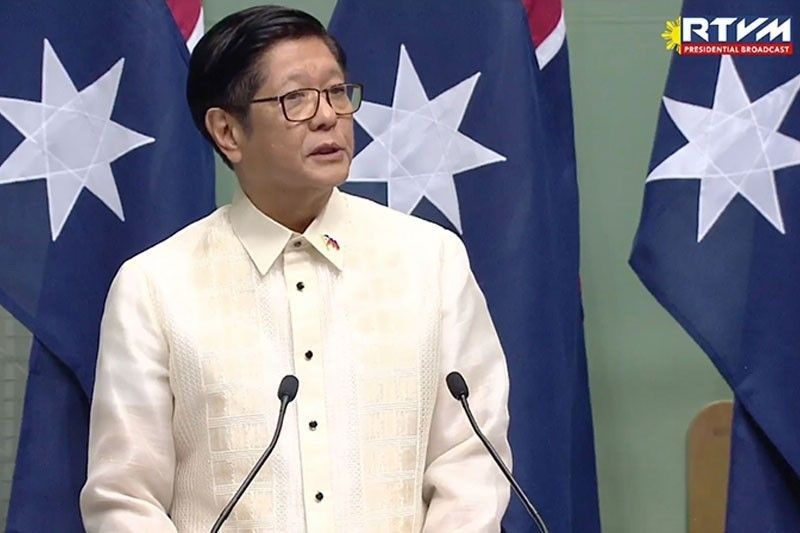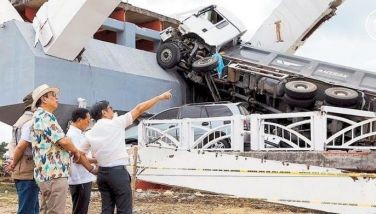Marcos Jr. bans ‘wang-wang’ use by government officials

Rules tightened on protocol plate issuance
MANILA, Philippines — For road safety and better traffic management, President Marcos has revived a policy prohibiting government officials and personnel from using sirens or wang-wang, blinkers and other similar signaling or flashing devices.
At the same time, Marcos has restricted the use of protocol license plates, with judges losing the privilege.
Exempted from the order on sirens are official vehicles of the Armed Forces of the Philippines (AFP), National Bureau of Investigation (NBI) and Philippine National Police (PNP) as well as fire trucks, hospital ambulances and other emergency vehicles.
“All government officials and personnel are prohibited from utilizing sirens, blinkers and other similar gadgets that produce exceptionally loud or startling sound, including dome lights, blinkers, or other similar signaling or flashing devices,” declared Marcos’ Administrative Order No. 18, which Executive Secretary Lucas Bersamin signed on March 25.
Benigno “Noynoy” Aquino III, during his presidential inaugural address in 2010, announced a policy against wang-wang, which he said was a message against VIP entitlements and those who want to jump the line at ordinary people’s expense.
Marcos’ father and namesake had imposed a similar ban during martial law, under Presidential Decree 96 in 1973.
PD 96 allows only the AFP, PNP, NBI, fire trucks and hospital ambulances to use sirens, bells, horns or similar gadgets.
Marcos said the administration is committed to promote the welfare and well-being of the public by ensuring a safe and more organized road and traffic environment.
Marcos said the unauthorized and indiscriminate use of sirens, blinkers and other similar signaling or flashing devices has been rampant, causing traffic disruptions and unsafe road and traffic environments.
Unauthorized and improper use of signaling or flashing devices by government officials and employees will be dealt with in accordance with the law, the AO said.
“Government officials and personnel are reminded that the use of sirens, dome lights, blinkers and other similar devices would only be allowed under exigent or emergency circumstances or situations, or to ensure the expedient and safe passage of emergency responders,” Marcos said.
He tasked the Department of Transportation (DOTr) along with other government agencies to review, regulate and evaluate, and update existing policies and guidelines to ensure effective implementation of AO 18 subject to existing laws, rules and regulations.
The order will take effect immediately after publication in the Official Gazette, or in a newspaper of general circulation.
Limited protocol plates
Meanwhile, Marcos limited the number of government officials to be issued with low-numbered or protocol plates due to increasing complaints on their proliferation and unauthorized use.
Executive Order 56, issued by Marcos on March 25, reduced the number of officials entitled to use protocol license plates from 16 to 14.
Included in the list are the President with number one designation; Vice President, two; Senate President, three; House Speaker, four; Chief Justice, five; Cabinet secretaries, six; senators, seven; members of the House of Representatives, eight, and Supreme Court associates justices, nine.
The list also included the presiding justices of the court of appeals, tax appeals and Sandiganbayan as well as solicitors general, who were given the number 10; chair of constitutional commission and ombudsman, 11, and AFP and PNP chiefs, 14.
Although the associate justices of the CA, CTA and Sandiganbayan may be allowed to use protocol license plates upon the recommendations of the Land Transportation Office and approval of the DOTr secretary, this should not be “construed to authorize all other officials with equivalent rank as the associate justices and below to use protocol license plates,” the EO said.
It said protocol license plates issued to authorized officials should only be valid during their incumbency, and used for motor vehicles duly registered in their names or officially assigned to them.
The plates should be surrendered to the LTO upon an official’s retirement, resignation and separation from office, or end of term or tour of duty.
EO 56 amended EO 400 issued in 2005 by then president Gloria Macapagal-Arroyo.
“All previously issued protocol license plates issued pursuant to EO 400, as amended, except those issued to incumbent authorized officials under Section 1 hereof, are deemed expired,” the EO read.
The LTO was directed to revoke and/or confiscate all expired protocol license plates.
EO 56 allows officials a maximum of two pairs of protocol plates.
The President, Vice President, Senate President, House Speaker and Chief Justice may be allowed a maximum of three pairs.
Welcome decision
Senators welcomed Marcos’ decision to prohibit the use of sirens and other blaring devices on the road by government officials and personnel.
Sen. Grace Poe said government officials should set an example by not using their positions to get special treatment on roads.
Senate Majority Leader Joel Villanueva said it is time for the government to “reject the wang-wang mentality.”
Sen. JV Ejercito, who bikes to work, expressd support to the policy, saying the use of wang-wang on the road to avoid traffic has become a trend for government officials these days.
Sen. Ronald dela Rosa advised government officials to leave their houses early to avoid traffic instead of abusing the use of wang-wang.
But Sen. Imee Marcos urged the President to provide exemptions to his directive, like allowing its use for the country’s official guests in state visits.
She said foreign guests should be given the “courtesy” of having a convoy that uses wang-wang and avoid traffic and protest actions on the road.
LGUs help sought
The PNP appealed to other concerned agencies and local government units (LGUs) to assist its men in implementing the ban on the use of sirens and blinkers by state officials and personnel on the road.
PNP’s chief information officr Col. Jean. Fajardo said government agencies such as the Metropolitan Manila Development Authority and LGUs, especially in Metro Manila, should extend the working hours of their traffic enforcers.
“Sana ma-extend ‘yung duty hours nung ibang mga ahensya para magkatulong-tulong tayo na tuluyang matigil itong illegal at unlawful use ng sirens and blinkers,” Fajardo said in a news briefing at Camp Crame.
The Metro Manila Council on Wednesday adjusted the working hours of LGU employees from 8 a.m. to 5 p.m. to 7 a.m. to 4 p.m.
Fajardo said additional manpower, apart from PNP officers on the road, especially during rush hour is needed.
Taking note of the volume of vehicles during the rush hour traffic, Fajardo said the possibility that some motorists may escape the attention of traffic enforcers is high.
The Highway Patrol Group (HPG) confiscated 2,546 blinkers, sirens, modified mufflers and other illegal attachments when it implemented PD 96 from January to March this year.
In 2023, the HPG seized up to 7,931 illegal attachments from motor vehicles.
Fajardo warned civilians as well as police officers and other members of the uniformed service who are using blinkers and sirens for their private vehicles, saying no one is exempt from PD 96 regardless of their status in life. – Marc Jayson Cayabyab, Emmanuel Tupas
- Latest
- Trending




























